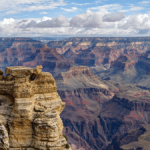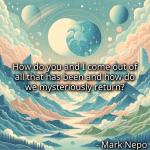
“The Sabbath was made for people, not people for the Sabbath.” — Jesus of Nazareth
I have been thinking about rituals lately. Amusingly, the English word “spiritual” includes the word “ritual”. How do you feel about ritual? For me, it depends on the purpose of my participation and the purpose of the ritual itself.
For this article, I am using ritual as a pattern of thought, word, and/or action repeated on some regular basis. Rituals can take place in prescribed places (e.g., an altar, a grove, a cave, a ballpark, a kitchen table) and may make use of certain physical elements (e.g., fire, water, oil, incense, food, music). Rituals can be extraordinary rites unusual to the pattern of daily living. They can also be the ordinary repeated practices that shape the rhythm of daily, weekly, and seasonal life for an individual or a community.
Rituals can be in support of myth and story, like the rituals around holy communion in Christianity; the ritual of bathing in the Ganges River for Hindus; or the singing of the National Anthem at a public sporting event. Ritual can be symbolic pointing toward an ideal or the metaphysical (as is the case with many patriotic and religious rituals). Ritual can also be for its own sake (as with just sitting and breathing or perhaps brushing one’s teeth each day). Some rituals involve a community of people and reinforce our connection with one another, while others are done just for oneself.
I find two forces at play as I reflect on my relationship with ritual. My intellectual sensibilities are generally those of a pragmatist and a realist. I want to think, speak, and act plainly saying and doing what I mean moment by moment. I want to call a thing what it is and use it as it is intended. If it is not useful, I let it go. I also have the soul of a poet relishing beauty, delighting in nuance and the obliquely numinous. When these sensibilities arise, I tread softly and bow, embracing unknowing before great mystery.
Which is to say, subjectivity is important. As with all of life, rituals are what we make of them. Ritual can be a confusing pattern of gestures, incantations, and movements that feel empty (even with an understanding of historical and sacred intention). Ritual can also be a point of access to mindful participation in life resulting in greater care for oneself and others.
The world has recently had occasion to witness the ritual of the coronation of King Charles III of England. Did you watch it? I did not. The happenings of the British Monarchy seem wasteful and unnecessary to me as an American. For me, this is an empty ritual. But I did engage in the useful ritual of brushing my teeth that day, which actually helps me whether I brush mindfully or not.
At the end of life, I observe that some people make sense of death with their beliefs. This is an intellectual exercise; an attempt to influence feelings of grief with thoughts. If that works for them, I am glad. I do not judge. There are also many people who crave some type of solemnization to mark the end of their loved one’s life. They need a ritual. Some oil on the forehead. Doors and windows open. Or kept closed. Lighting a candle. Holding hands in a circle around the deathbed. Words of affirmation, prayer, or blessing. Someone to speak out loud, “This will be difficult and painful; and you will survive.”
What makes one ritual empty and what gives another ritual meaning? We do. Ritual serves the participants, not the other way around. I have a morning routine and a bedtime one, which include rituals for caring for my body, mind, and spirit. These practices support me. These rituals provide a form in which inspiration may occur. Mariel Hemingway said, “A daily ritual is a way of saying, ‘I’m voting for myself; I’m taking care of myself.’”
Vivek Murthi, the Surgeon General of the United States recommends four daily rituals to help with loneliness: “The first is to spend 15 minutes a day connecting with somebody you care about. That could be calling them up. It could be video conferencing with them. It could be sending them a text just to say, ‘Hey, I’m thinking of you. I just wanted you to know that you’re on my mind.’” The second is to give people your full attention when talking with them. Third, find opportunities to serve others. And the fourth is to practice solitude.(1)
There must have been someone who found the coronation meaningful, else they wouldn’t have done it. Maybe the King did.
__________
Learn about Membership in the Spiritual Naturalist Society
The Spiritual Naturalist Society works to spread awareness of spiritual naturalism as a way of life, develop its thought and practice, and help bring together like-minded practitioners in fellowship.
SNS strives to include diverse voices within the spectrum of naturalistic spirituality. Authors will vary in their opinions, terms, and outlook. The views of no single author therefore necessarily reflect those of all Spiritual Naturalists or of SNS.
__________
Notes:
(1) Surgeon General, Vivek Murthy, MD, in an interview with Krista Tippett (audio and transcript here: https://onbeing.org/programs/vivek-murthy-to-be-a-healer/).















